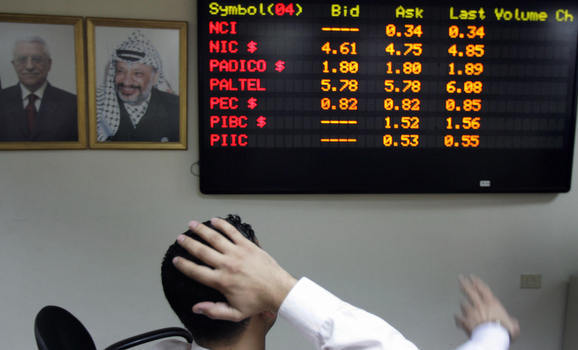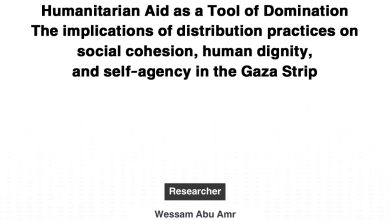Palestinian Stock Exchange Lacks Public Regulation

By: Omar Shaban
![]() Any modern state should seek to establish a modern stock exchange to buy and sell various types of stocks and attract foreign and domestic investment, including small-scale traders, because doing so boosts the economy. Stock markets have become indicators that are followed by economic and financial-policy makers.
Any modern state should seek to establish a modern stock exchange to buy and sell various types of stocks and attract foreign and domestic investment, including small-scale traders, because doing so boosts the economy. Stock markets have become indicators that are followed by economic and financial-policy makers.
Stock markets are tools for investment and development, but they can also play a role in financial crises, as happened in east Asia in 1997, when the economies of Thailand, Indonesia and others collapsed overnight. For this reason, stock markets are usually highly regulated and governments can sometimes directly intervene in them, as happened in Egypt after the revolution.
The Palestinian case
The Palestine Securities Exchange (PSE) is a private for-profit company established in 1995 in Nablus. It was the first Arab stock exchange to be 100% privately owned. Its first trading session was in February 1997, and by the end of 2012, it had 48 listed companies with a total market capitalization of $2.86 billion. Approximately 95% of stock owners are Palestinian and 5% are foreign, while Palestinians own 59% of the total shares and foreigners own 41%. Companies listed in the exchange made $120 million in profits in 2012.
The PSE was founded one year after the first Palestinian legislative elections. The new legislature had no experience with such complex matters, compared with the monopolies that arrived in Palestine with the Palestinian Authority’s (PA) establishment in 1994. The PSE operated under an agreement with the PA — represented by the Ministry of Finance — for eight years until 2004, when the PA became aware of the unhealthy situation and passed Securities Law No. 12 of 2004. The PA also passed Law No. 13 of 2004, establishing the Palestinian Capital Market Authority (PCMA) as a supervisory and regulatory body for the stock market.
The PSE had made for itself a number of rules that regulated trading and disclosure before the establishment of the PCMA, the body that is supposed to make those rules. Thus, the PCMA had no choice but to ratify pre-existing PSE rules. In effect, the corporate sector had overtaken the political and legislative structures in forming part of the economic and investment infrastructure in the Palestinian territories.
This legally questionable situation affected other areas. Some Palestinian businessmen abroad rushed to partner with their counterparts inside and established private joint-stock companies with long-term monopoly contracts with a newborn and inexperienced political authority. These contracts were in telecommunications, electricity, industrial zones and other areas.
The Palestinian Capital Market Authority, a late birth
The PCMA was established according to Article No. 2 of the Law of the Capital Market Authority No. 13 for 2004. The PA president approved it on Dec. 1, 2004. The PCMA is financially and administratively independent, and works to create a climate favorable to achieving stability and capital growth. It also develops and organizes the stock market and protects investors’ rights. The PCMA supervises the stock market, insurance companies, leasing companies and mortgage companies. Although its mission also includes the completion of the legal and administrative environment controlling the mortgage, leasing and non-banking financial sectors, the legal status of the stock market has hardly changed.
The Law of the Capital Market Authority provides that the PCMA should be managed by a seven-member board, but its current board has six members, which is against the law. Its first board was formed in 2006, two years after the PCMA’s formation and 10 years after the PSE’s formation.
Ownership and management
The PSE has 19 owners and a paid-up capital of $10 million. The Palestine Development and Investment Company (PADICO), registered in Liberia, owns 67.69% of the PSE.
The PSE is administered by a seven-member board, six of whom represent PADICO, while two of those six members are not Palestinian. Some members are executives of large companies whose shares are listed in the exchange. This is a conflict of interest because one person is both the supervisor and the supervised, as is the case with Samir Hulileh, who is a board member of the PSE as well as the CEO of PADICO, which owns a majority stake in the PSE.
PADICO is one of the largest companies in Palestine, and it fully or partly owns most companies in the Palestinian territories in the areas of communications, banks, electricity, hotels, industry and others. PADICO, its subsidiaries and affiliates control about 74% of the PSE market capital. PADICO’s own stock is also listed in the exchange.
Questions
[box type=”shadow” align=”alignleft” ]Of course, the existence of the PSE is necessary to encourage investment. It is also a symbol of sovereignty and development, but it needs reform in many areas. The following questions should inform this process:[/box]
- How can a foreign for-profit company establish the PSE and present itself as a public company without allowing its stock to be publically traded, despite its repeated promises to do so?
- Why doesn’t the PA own shares in PADICO? If it did, that income could help the PA in its financial crisis.
- Why was the PSE given the exclusive right to manage the stock exchange without giving other companies the opportunity to bid? How much did the PSE pay the PA to get that exclusive right? When will that right expire?
- What are the legal, financial and economic grounds to grant a monopoly to a private company that is not under the PA’s or the legislature’s supervision?
A stock exchange should be a not-for-profit public company, as is the case in Egypt and Jordan, where the law provides for licensing many securities companies, each of which specializes in a specific sector so that they do not compete with each other.
[highlight]http://www.al-monitor.com/pulse/originals/2013/05/palestinian-stock-exchange.html[/highlight]




